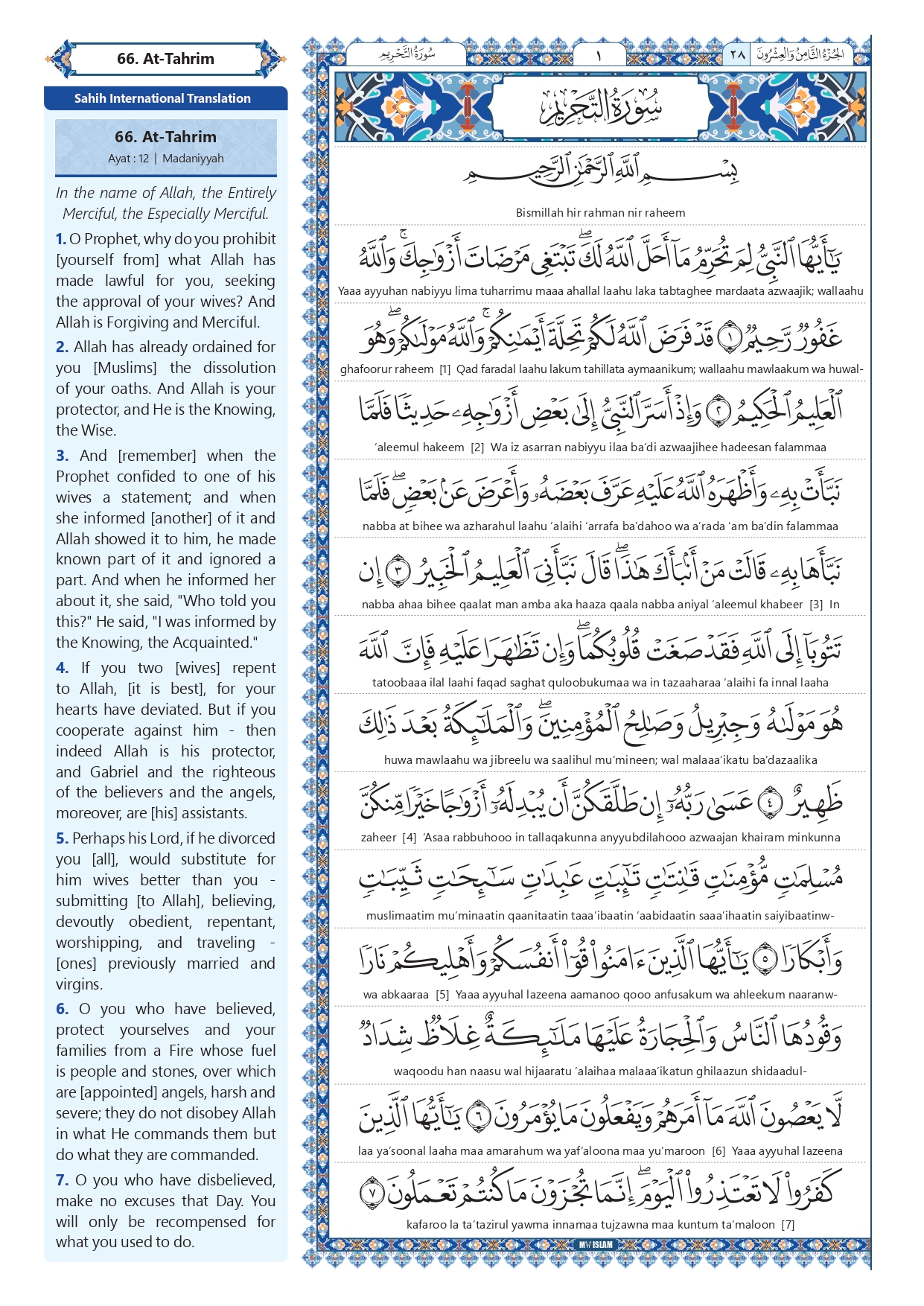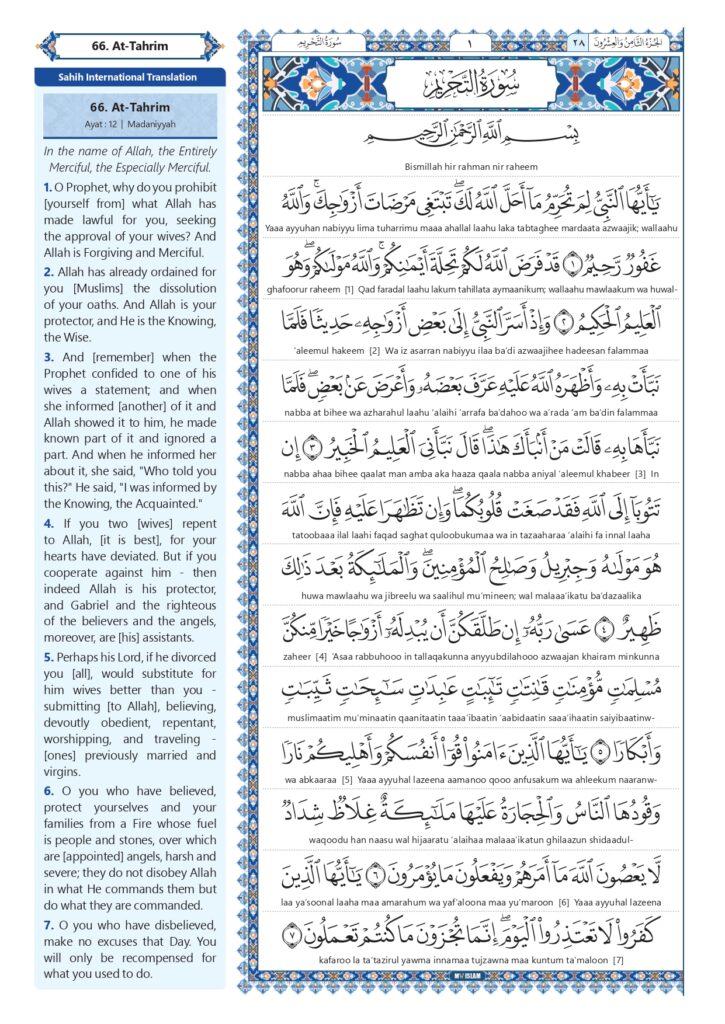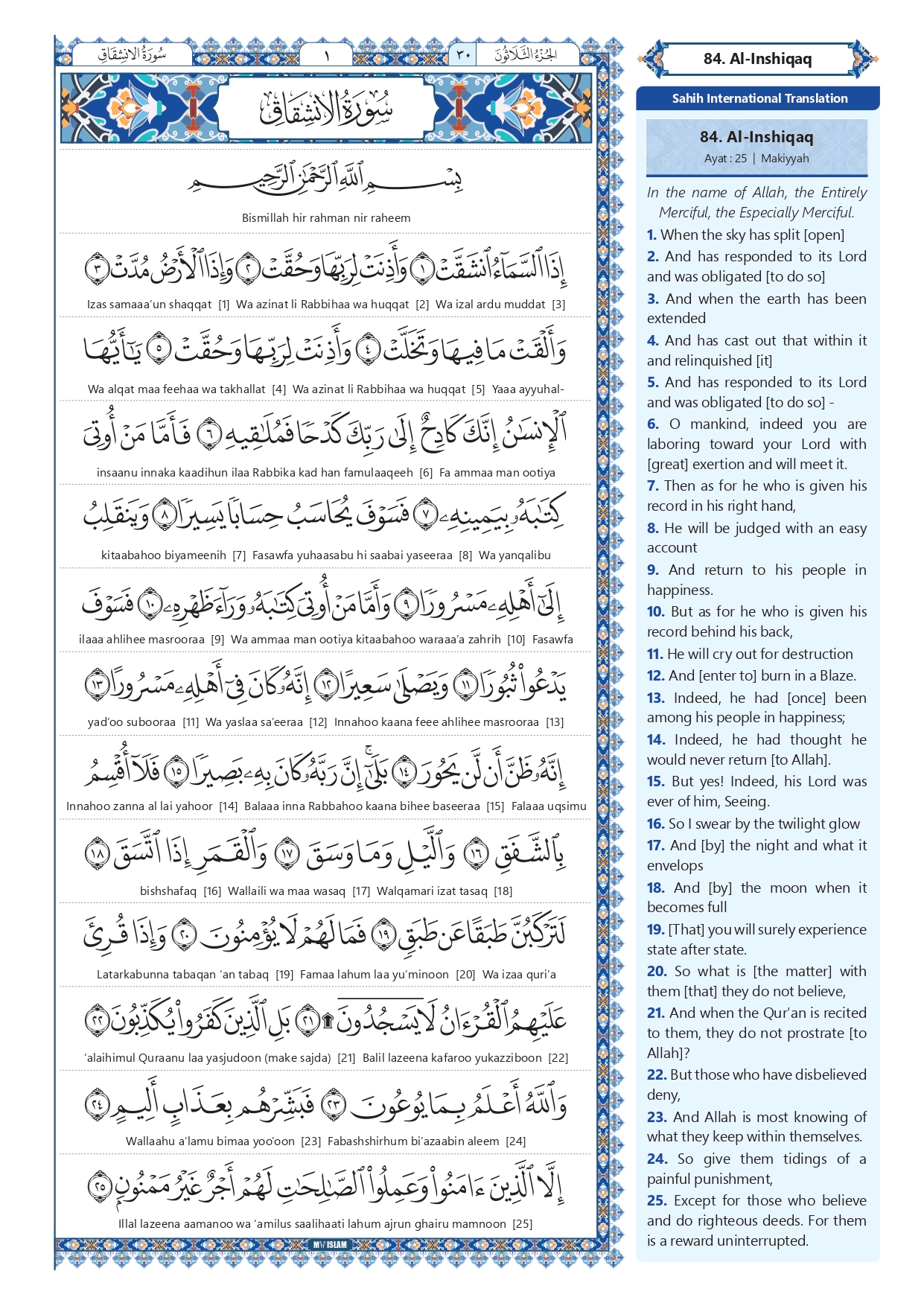Surah Tahrim in English Transliteration is the 66th chapter of the Quran, revealed in Madinah and consisting of 12 verses. The name “At-Tahrim” translates to “The Prohibition,” highlighting the theme of lawful and prohibited actions, especially in relation to the Prophet Muhammad’s (peace be upon him) household. It addresses matters related to personal conduct, marriage, and family dynamics, offering guidance for both spiritual and social life.
Surah At-Tahrim:
Surah At-Tahrim speaks of sincerity and self-correction.
Let its words remind you to seek forgiveness often.

Keep Arabic-OM.com in your heart and your browser for gentle reminders.
surah Tahrim in english transliteration


Surah Tahrim in English Transliteration text
A’uthu billahi min ash-shaytan ir-rajim
Bismillahir Rahmanir Raheem
- Ya ayyuhan-nabiyyu lima tuharrimu ma ahallallahu laka tabtaghee mardata azwajik; wallahu ghafoorur raheem
- Qad faradallahu lakum tahillata aymaanikum; wallahu mawlaakum wa huwa al-‘aleemul hakeem
- Wa idh asarran-nabiyyu ila ba’di azwajihi hadeethan falamma nabba’at bihi wa azhharahu Allahu ‘alayhi ‘arrafa ba’dahu wa a’rada ‘an ba’d; falamma nabba’ahaa bihi qaalat man anba’aka hatha qala nabba’anee al-‘aleemul khabeer
- In tatoobaa ila Allah faqad saghat quloobukuma wa in tatazaahara ‘alayhi fa inna Allah huwa mawlahu wa jibreelu wa salihu al-mu’mineen; wal-malaa’ikatu ba’da dhalika zaheer
- ‘Asaa rabbuhu in tallaqakunna an yubdilahu azwaajan khayram minkunna muslimaatin mu’minaatin qaanitaatin taa’ibaatin ‘aabidatin saaihaatin thayyibatin wa abkaara
- Ya ayyuhalladheena aamanoo qoo anfusakum wa ahleekum naaraan waqooduha an-nasu wal-hijaarah ‘alayha malaa’ikatun ghilaa thun shidaadun la ya’soona Allaha ma amarahum wa yaf’aloona ma yu’maroon
- Ya ayyuhal ladheena kafaroo la ta’tadhiroo al-yawma innama tujzawna ma kuntum ta’maloon
- Ya ayyuhal ladheena aamanoo tooboo ila Allahi tawbatan nasoohan ‘asaa rabbukum an yukaffira ‘ankum sayyiatikum wa yudkhilakum jannatin tajree min tahtiha al-anhaar yawma la yukhzi Allahu an-nabiyya walladheena aamanoo ma’ahu; nooruhum yas’aa bayna aydeehim wabi aymaanihim yaqooloona rabbanaa atmim lana noorana waghfir lana innaka ‘ala kulli shay’in qadeer
- Ya ayyuhan-nabiyyu jaahidil kuffara wal-munafiqeena waghlu ‘alayhim; wa ma’waahum jahannam wa bi’sa al-maseer
- Daraba Allahu mathalan lilladheena kafaroo imra’ata Noohin wa imra’ata Loot; kaanataa tahta ‘abdayni min ‘ibaadina saalihayn fakhaanataahumaa falam yughniyaa ‘anhumaa min Allahi shay’an wa qeelaa adkhula an-naar ma’a ad-daakhileen
- Wa daraba Allahu mathalan lilladheena aamanoo imra’ata fir’awn idh qalat rabbibni lee ‘indaka baytan fil-jannati wa najjinee min fir’awn wa ‘amalihi wa najjinee min al-qawmiz-zalimeen
- Wa Maryam abnata ‘Imrana allatee ahsanat farjahaa fanafakhna feehi min roohinaa wa saddaqat bikalimaati rabbihaa wa kutubihi wa kaanat minal-qaniteen
English Translation:
- O Prophet, why do you prohibit [yourself from] what Allah has made lawful for you, seeking the approval of your wives? And Allah is Forgiving and Merciful.
- Allah has already ordained for you [Muslims] the dissolution of your oaths. And Allah is your protector, and He is the Knowing, the Wise.
- And [remember] when the Prophet confided to one of his wives a statement; and when she informed [another] of it and Allah showed it to him, he made known part of it and ignored a part. And when he informed her about it, she said, “Who told you this?” He said, “I was informed by the Knowing, the Acquainted.”
- If you two [wives] repent to Allah, [it is best], for your hearts have deviated. But if you cooperate against him – then indeed Allah is his protector, and Gabriel and the righteous of the believers and the angels, moreover, are [his] assistants.
- Perhaps his Lord, if he divorced you [all], would substitute for him wives better than you – submitting [to Allah], believing, devoutly obedient, repentant, worshipping, and traveling [in obedience], previously married and virgins.
- O you who have believed, protect yourselves and your families from a Fire whose fuel is people and stones, over which are [appointed] angels, harsh and severe; they do not disobey Allah in what He commands them but do what they are commanded.
- O you who have disbelieved, make no excuses that Day. You will only be recompensed for what you used to do.
- O you who have believed, repent to Allah with sincere repentance. Perhaps your Lord will remove from you your misdeeds and admit you into gardens beneath which rivers flow [on] the Day when Allah will not disgrace the Prophet and those who believed with him. Their light will proceed before them and on their right; they will say, “Our Lord, perfect for us our light and forgive us. Indeed, You are over all things competent.”
- O Prophet, strive against the disbelievers and the hypocrites and be harsh upon them. And their refuge is Hell, and wretched is the destination.
- Allah presents an example of those who disbelieved: the wife of Noah and the wife of Lot. They were under two of Our righteous servants but betrayed them, so they [those prophets] did not avail them from Allah at all, and it was said, “Enter the Fire with those who enter.”
- And Allah presents an example of those who believed: the wife of Pharaoh, when she said, “My Lord, build for me near You a house in Paradise and save me from Pharaoh and his deeds and save me from the wrongdoing people.”
- And [the example of] Mary, the daughter of ‘Imran, who guarded her chastity, so We blew into [her garment] through Our angel, and she believed in the words of her Lord and His scriptures and was of the devoutly obedient.
How to Memorize Surah Tahrim in English Transliteration
- Memorization Tips: Break down the Surah into smaller sections, repeating each verse multiple times until memorized. Pair your memorization with listening to audio recitations for pronunciation accuracy.
How to Recite Surah Tahrim in English Transliteration
- Recitation Guidance: Focus on Tajweed rules, which govern the proper articulation of each word. Practice daily, even for a few minutes, to maintain what you have memorized.
Surah Tahrim in English Transliteration Benefits
- Moral and Ethical Guidance: This Surah provides wisdom on managing family affairs, stressing the importance of patience, forgiveness, and commitment to one’s faith.
- Spiritual Reflection: The verses encourage believers to turn to Allah with sincere repentance (Tawbah) and strive to purify their hearts and souls.
- Protection from Temptation: Reflecting on its teachings helps guard against actions that displease Allah and reinforces the importance of righteous behavior.
Learn Quran with Us for Free
We are dedicated to helping you learn the Quran in an easy and accessible way. Our platform offers free resources, including word-by-word translations, transliterations, and explanations of the Quranic verses. By joining our community, you can enhance your understanding and connect with others passionate about learning the Quran.
surah mulk in english Transliteration Meaning, Benefits, and How to Learn 67
Frequently Asked Questions about Surah Tahrim in English Transliteration
- What is the central theme of Surah Tahrim in English Transliteration?
The Surah deals with themes of lawful and prohibited matters, particularly within the Prophet’s household, and stresses sincere repentance. - Why was Surah Tahrim in English Transliteration revealed?
It addresses specific incidents involving the Prophet’s family, providing lessons on obedience, repentance, and the consequences of disobedience. - How does Surah Tahrim in English Transliteration guide us in family matters?
It emphasizes the importance of faith and righteousness within family dynamics and provides examples of both righteous and disobedient spouses. - What does the term “At-Tahrim” mean?
It means “The Prohibition,” referring to actions made unlawful, especially those involving personal vows. - How can I memorize this Surah effectively?
Practice consistently, use transliteration for assistance, and recite with a Quranic teacher if possible. - What are the benefits of reciting Surah Tahrim in English Transliteration regularly?
It brings awareness of lawful and unlawful matters, promotes sincere repentance, and strengthens family bonds through spiritual reflection. - Can reciting this Surah help with personal discipline?
Yes, reflecting on its teachings can inspire believers to adhere to Islamic ethics and develop greater self-control. - What stories or parables are mentioned in this Surah Tahrim in English Transliteration?
It includes the stories of the wives of Prophets Noah and Lot as examples of disobedience, contrasted with the story of Pharaoh’s wife and Maryam as exemplars of faith. - Is there any specific time to recite Surah Tahrim in English Transliteration?
While there is no prescribed time, reciting it during personal reflection or family gatherings can be beneficial. - Where can I learn the correct pronunciation of this Surah Tahrim in English Transliteration?
Our website provides free audio resources and video lessons to help you perfect your recitation.



